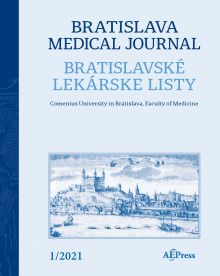Journal info
|
||||
Select Journal
Journals
Bratislava Medical Journal 2024 Ahead of print 2023 2022 2021 2020 2019 2018 2017 2016 2015 2014 2013 2012 Endocrine Regulations General Physiology and Biophysics Neoplasma Acta Virologica Studia Psychologica Cardiology Letters Psychológia a patopsych. dieťaťa Kovove Materialy-Metallic Materials Slovenská hudbaWebshop Cart
Your Cart is currently empty.
Info: Your browser does not accept cookies. To put products into your cart and purchase them you need to enable cookies.
Bratislava Medical Journal Vol.121, No.9, p.648–655,2020 |
||
| Title: The dosage-dependent prenatal caffeine exposure adversely affects levels of integrin αVβ3 and MMP-9 in a rat model of embryo implantation | ||
| Author: F. Yilmaz, I. Tekmen | ||
| Abstract: OBJECTIVE: In the pregnancy period, it is recommended to limit the consumption of caffeine. However, the mechanisms of caffeine effect during pregnancy are not fully known. In our study, we aimed to investigate the effect of prenatal caffeine consumption on the embryonic implantation in rats as well as shed light on the relationship between the molecules and implantation stages. MATERIALS AND METHODS: Forty-five Wistar albino pregnant rats were randomly divided into 3 main groups, namely into control, low‑dose and high‑dose groups, representing the dose-dependent effects of caffeine. Each main group was divided into 3 subgroups, namely those to be sacrified on days 4 (pre-implantation), 5 (peri-implantation) and 6 (post-implantation) . Different doses of caffeine were given on consecutive days, starting from day 1 of pregnancy up to the day of euthanasia. The implantation sites were investigated with the use of hematoxylin et eosin, Masson trichrome and immunostaining of VEGF, MMP-9, integrin αVβ3, mucin-1 and HB-EGF. RESULT: Prenatal caffeine consumption in rats resulted in a dose-dependent decrease in the number of implantation sites. It has been shown that the immunoreactivity of integrin αVβ3 and MMP-9 underwent a change. CONCLUSION: It has been shown that the levels of integrin αVβ3 and MMP-9 were decreased by prenatal caffeine consumption in rats, which resulted in a decrease in embryo implantation in a dose-dependent manner, especially in the high-dose group (Fig. 5, Ref. 36). Text in PDF www.elis.sk |
||
| Keywords: caffeine, embryo implantation, integrin, MMP-9 | ||
| Published online: 21-Aug-2020 | ||
| Year: 2020, Volume: 121, Issue: 9 | Page From: 648, Page To: 655 | |
| doi:10.4149/BLL_2020_105 |
||
|
|
 download file download file |
|

